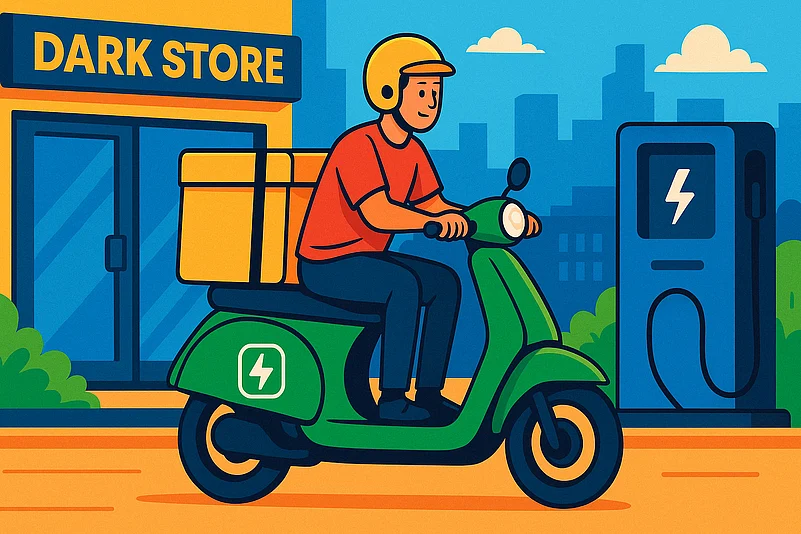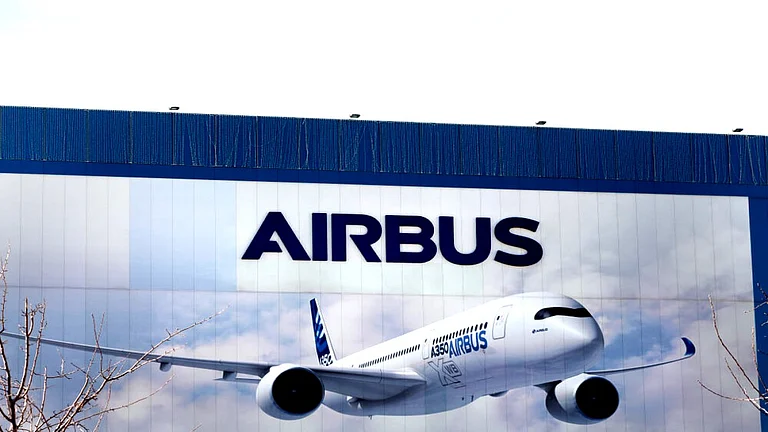At Blinkit’s bustling dark store in East Delhi’s Nirman Vihar, speed is the name of the game. Workers zip between shelves picking up groceries, packers ready orders in under two minutes, and delivery partners swoop in to whisk them away — often on electric two-wheelers.
“We put every item at a designated place so that it becomes easier to locate them when an order is placed,” says Vikas Kumar, who manages the 3,000-square-foot store that’s been operational since 2021. Around 400 delivery partners are associated with this location alone.
Just down the road, rivals Zepto and Swiggy Instamart have set up competing dark stores, drawn by strong customer demand. Nearby, a Yulu battery-swapping station operates around the clock, serving nearly 100 riders per eight-hour shift.
“It hardly takes three to four minutes to change the battery,” says a Blinkit delivery partner.
EV Shift Gains Ground
Major quick commerce players — including Blinkit, Zepto, Swiggy Instamart, Flipkart Minutes, and BigBasket Now — are accelerating the shift from petrol-powered two-wheelers to electric vehicles (EVs).
Instamart aims to transition to a 100% EV fleet by 2030, while Blinkit says roughly 80% of its last-mile fleet in Gurugram is already electric.
That pivot is fuelling demand for fleet operators like Zypp Electric, Yulu, and EMO Energy, who now derive a majority of their revenue from servicing the quick commerce segment.
Zypp has doubled its EV fleet year-on-year. Yulu, meanwhile, has tripled its size in two years. “Ninety percent (90%) of Yulu’s revenue comes from goods delivery. Within this, a majority is made up of riders who use Yulu’s platform to make quick commerce deliveries for Instamart, Zepto, Blinkit and other brands,” says co-founder Amit Gupta.
Chartered Bikes, an electric two-wheeler leasing company, now attributes half its revenue to the quick commerce sector. The company’s fleet has expanded 20% over the past year, according to co-founder Param Mandloi.
As platforms look to trim operational costs, EVs offer an edge. With operating expenses of Rs 1.5–2 per km, compared to Rs 4 for petrol vehicles, they’re proving to be a more economical option for fleet operators and gig workers alike. Their zero-emission profile also supports government-backed sustainability and EV adoption goals.
Tier-II Push, EV Pull
India’s quick commerce industry is on a tear. The sector is expected to grow 75% year-on-year in 2025, according to a Bernstein report, with growth fuelled by category expansion and inroads into tier-II and smaller cities.
This geographical shift has sparked fresh demand for EVs. Changing consumption patterns and growing digital adoption in non-metro areas have prompted EV firms to enter new markets.
Yulu, for example, introduced a franchise-based model in 2024, enabling local entrepreneurs to operate EV rental services in cities like Indore, Kochi, Madurai, Vadodara and Kolkata.
Zen Mobility is piloting its ThermoFlex three-wheeler for fresh produce and pharma deliveries in tier-II locations. “We've observed a strong preference for our three-wheeled vehicles among our quick commerce partners, including Zomato and Blinkit,” says CEO Namit Jain. “They offer the payload capacity, safety features and efficiency today’s delivery demands require.”
Charging Up: Dark Stores and Infrastructure
As EV adoption rises, so does the need for charging infrastructure — especially around dark stores that serve as the operational nerve centres of quick commerce platforms.
Fleet operators are increasingly moving away from battery swapping in favour of on-site fast charging to minimize downtime.
EMO Energy, Kazam, and Zypp Electric are deploying fast chargers at dark stores and hubs. “We provide fast chargers at dark stores or hubs, enabling quick charging within 20 minutes,” says Sheetanshu Tyagi, CEO, EMO Energy. “This allows riders to operate efficiently for about 4–5 hours or cover approximately 50 kilometres per charge.”
EMO plans to install 1,000 fast chargers across key markets. “Currently, we have 200 chargers installed in locations like Bangalore, NCR, and Mumbai,” Tyagi adds.
Industry experts say battery swapping causes up to 1.5 hours of daily downtime, as riders travel to and from swap stations. On-site charging during pickups could significantly reduce delays and range anxiety.
“We are developing our own dark stores and trying to incorporate a few chargers for two-wheeler EVs,” says Dhruv Bhatia, co-founder of ZEVO. Experts say platforms now prefer dark store properties with built-in EV infrastructure.
The urgency is evident. Instamart aims to hit 1,000 dark stores by this month. Blinkit, which recently crossed the 1,000-store mark, targets 2,000 by December 2025. Zepto is estimated to operate approximately 1,147 dark stores across India.
New Revenue Models Emerge
As EV fleets scale, quick commerce players are adopting diverse financing and ownership models.
BigBasket and Flipkart prefer owning their fleets and absorbing infrastructure costs directly. In contrast, Blinkit and Swiggy opt for operational expenditure (OPEX) models — such as EMIs or revenue-sharing agreements under three- to five-year contracts — to avoid heavy upfront investments.
“Some quick commerce platforms are also seeking pay-per-use or subscription-based models that include servicing, insurance, and fleet management,” says Zen Mobility’s Jain.
Riders typically fall into two categories: those who own EVs and sign up as gig workers on platforms like Zepto or Blinkit, and those who lease vehicles from firms like Yulu. In the latter case, the platform facilitates the connection between rider and lessor via its app.
“Yulu’s own presence in urban India is closely aligned to the surge in demand for quick commerce,” says a company spokesperson. “Our fleet has tripled in the last 24 months, and the share of quick commerce riders within it has more than doubled.”
The momentum is expected to continue. India’s commercial EV fleet — currently around 2 million — could more than double to 4.5 million over the next four years, estimates Kunal Mundra, CEO and co-founder of Astranova Mobility.
“Because of the speed at which they (fast delivery platforms) are growing, they want to more than double the number of riders on their platforms,” Mundra says. Astranova plans to deploy about $1 billion in green mobility assets by 2030.
Speed Bumps Remain
Despite rapid growth, hurdles persist. Many riders remain wary of EVs due to concerns around charging availability, battery performance, and maintenance costs.
In January 2024, a major quick commerce platform lost 2–3% of its EV fleet riders following delays in service and payouts from leasing providers. The issue was resolved after the platform introduced expedited replacement services, according to an industry source.
Experts also question how meaningful the sector’s contribution to overall EV penetration might be.
“The push from quick commerce companies will aid EV adoption, but the contribution may remain marginal,” says Rohit Chaturvedi, Partner – Transport and Logistics at GIDAS, Forvis Mazars India.
NITI Aayog projects two- and three-wheeler EV sales to exceed 15 million units annually by 2030. Even if quick commerce triples its EV fleet, the sector may still account for fewer than 1 million units, Chaturvedi says.
Still, as competition intensifies, quick commerce platforms are betting that electrification — from fleets to dark stores — will help them deliver speed, savings and sustainability all in one go.
































